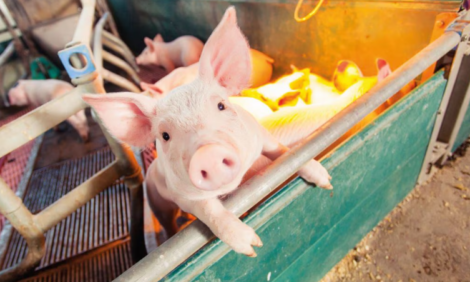



Hazards on Farm – Be Informed and Work Safe
Advice on preventing accidents from thr build-up of manure gases from Jaydee Smith, Production Systems Program Lead, in the latest Pork News and Views from Ontario's Ministry of Agriculture.There are hazards in any job and employers and workers need to be aware and take precautions. Farming is no different. Liquid manure and grain storage bins are two sources of potential risk at this time of year because of the activities taking place on the farm.
Hydrogen sulphide, carbon dioxide, methane and ammonia are natural by-products from the decomposition of organic matter and may be referred to collectively as manure gases. If appropriate precautions are not taken to prevent their build-up to dangerous concentrations, they present real dangers to workers or livestock on hog farms. If everybody working around liquid manure understands what the properties and risks are with each of these hazardous gases the danger of a tragic incident can be reduced.
Problems with these gases arise during pit agitation, pulling plugs, when transferring manure, when shutting down barns, and when there are incidents with foaming manure. At these times, it is essential to act as if the danger is present and take appropriate precautions. Always ventilate, be extra vigilant, know about the hazards, and close pull plugs immediately. Be aware of what causes sudden releases of these gases. Always know where the supply air is coming from in the barn. Preferably, use a hydrogen sulphide or multi-gas detector. These detectors are readily available and could save a life.
More information on these and other hazardous gases on farms is available in the OMAFRA Factsheet on Hazardous Gases [click here], or in the article on this topic in the August issue of Pork News and Views [click here].
At this time of year another potentially hazardous on-farm chore is cleaning grain or corn storage bins prior to storing the new harvest. Fine dust and mould spores can arise while moving old grain or corn, or while using compressed air or vacuuming during cleanup. Wear an N95 or N99 dust mask when handling grain to protect yourself from these hazards. Avoid moving about on top of old stored crops – what looks like a stable surface may collapse under you without warning.
Whenever you enter any confined space, such as a storage bin or manure pit, be sure to take appropriate precautions: ensure the air is safe to breathe and the area is ventilated; make sure that all equipment is locked out; use a secure safety line, and make sure there is someone to assist instantly if you run into trouble and that you are able to communicate, for example using hand gestures or by tugging on the line.
For more information on farm safety see Canada's Farm Safety Association web site.
Know the hazards in your job and take precautions. Be informed and work safe.
December 2011






